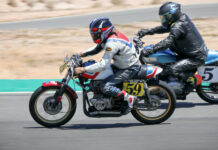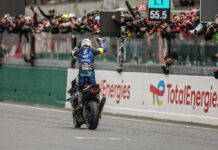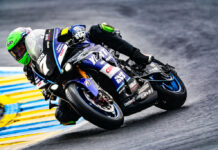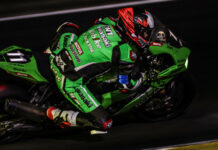FIRST PERSON/OPINION By David Swarts In January, AMA Pro Racing announced that it will implement a hardware price cap of $18,000 per motorcycle for engine control and data acquisition electronics in the Superbike class, beginning with the 2013 season and continuing through 2015. The only previous restriction required that hardware be homologated and approved for use by AMA Pro Racing Technical Director Of Competition Al Ludington. But teams say that hardware cost is not the biggest concern, with the cost of buying or developing software and hiring qualified technicians to run the complicated systems making up the bulk of the expense. Yoshimura Racing admits to spending $300,000 per season on electronics hardware, software, development, testing and personnel for its two-rider effort in AMA Pro Superbike. Yoshimura uses Magneti Marelli Marvel 4 systems and employs multiple technicians to run the systems. Monster Energy Graves Yamaha also runs Magneti Marelli Marvel 4 systems on its Superbikes and employs multiple technicians, but says one technician is assigned to run the Magneti Marelli SRT systems on its Daytona SportBikes. Jordan Suzuki and National Guard Suzuki use Pectel systems run by multiple technicians, while KTM uses Magneti Marelli SRT systems run by a technician who flies in from Italy for each AMA Pro Superbike round. Most of the other teams use much-less-expensive, much-less-capable, readily available race-kit black boxes (a.k.a. Engine Control Units, or ECUs) that sell for less than $3500 including wiring harness. Examples include Suzuki’s EM Pro system for GSX-R1000s and Yamaha’s YEC system for YZF-R1s. The BMW kit box for the S1000RR sells for about $4000 and plugs into the standard wiring harness. The Kawasaki kit box and wiring harness for the ZX-10R sell for less than $1500. A KTM kit box and setting tool for the RC8 R sells for under $1200. An EBR kit box for the 1190RS sells for $750. Meetings held as recently as last month between AMA Pro Racing officials and team representatives have revealed a deep divide in the paddock, with the majority of teams wanting to switch to kit boxes across the board, with a few notable holdouts. AMA Pro officials have openly admitted that they established the 2013-2015 rule now on the books based on one winning team’s threat to quit the series if it wasn’t allowed to continue using the Marvel 4 system currently fitted to its racebikes. To check where the top-10 players in the AMA Pro Superbike class stand on electronics rules, we posed the following questions: 1. What should the AMA Pro Superbike electronic rules be for 2013-2015 and why? 2. What do you say to someone who claims they need a year or more notice to get ready for any rule change, including switching from the currently allowed advanced electronics to kit boxes? Part Seven: Erik Buell, Owner Erik Buell Racing Team Hero, Team Amsoil/Hero Riders, Danny Eslick, Geoff May Electronics, EBR Kit “I don’t think we should have any [advanced electronics and rider aids]. I think the electronics need to be limited to some extent from a cost perspective like what they’ve done in Daytona SportBike. I think traction control should be allowed if it’s factory original and untampered. Otherwise you can shut it off or run without it. “And it’s not because I’m anti-traction control or anything like that. It’s just the difficulty of managing it, and the cost of the capability to get the really good systems to work at a staggering level, which the top guys have. And it’s making the racing not as good. That’s my opinion. We’ll go ahead with whatever [AMA Pro decides]. I’m not going to complain. I’m not going to whine. It’s just an opinion. “I don’t see an advantage to having these expensive traction control systems. Some guys say, ‘They’re not that expensive.’ Yeah, they are. Even if the cost of the electronics comes down, it’s the cost of the guys [engineers] who are talented enough to make the system work. It depends on what budget you have. “What I would like to see, the reason I think we should go away from it is the stuff that they’re doing doesn’t really feed back into what the customer gets at all, because nobody’s going to have an engineer riding along on the back of their GSX-R1000. If they say you can only run production traction control that might push the factories to develop even better traction control that actually is useable by the customer. So I’m supportive of that. “I think most guys would turn [traction control] off because it actually interferes more than helps. And in the hands of these incredibly good riders we have in the field you have to have a staggeringly exotic traction control system and programmers to make it better than their right wrists are. “So to me it doesn’t make sense. It’s a whole lot of money that all the teams can’t bring to the table. So it widens the spread between [teams of varying budgets]. In my mind, that money, if the teams didn’t have to spend it [on advanced electronics] you might see Jake Zemke and Tommy Hayden and Martin Cardenas on Superbikes, where they belong, and you would see the gap narrower. Would Josh Hayes still win? Yep. But he isn’t going to win by three seconds a lap. Josh is a stunningly good rider. I love the guy. He’s a good spokesperson for the series, and God bless Yamaha sticking with him and bringing him along. I think he’ll still win a lot of the time because he’s fit and he’s smart and the team’s good and the Yamaha’s an excellent bike. I just think the traction control is wrecking the show and keeping more riders out of the show. “If there is no limit to it, you can’t blame team owners for going ‘if somebody else is going to do it I’m going to do it.’ You can’t blame Keith McCarty [Yamaha Motor Corp., U.S.A., Racing Division Manager] for spending money because he’s allowed to. He’s afraid that if he doesn’t Yoshimura will or Honda will. He’s paid to win. “The other option is some kind of kit or other kind of traction control. Once again it comes back to the way these guys ride it’s going to boil down to who has the best engineers, the trickest way of making the thing work and all those kinds of things, which again I don’t think make for a good show and really doesn’t make for a better traction control system in the hands of customers. “We have a race ECU available. It just doesn’t have traction control. We can’t make a traction control that’s good enough for the riders. I don’t think that’s a bad sign on us, because neither does BMW, Kawasaki, Suzuki or Yamaha, right? It’s the trick aftermarket stuff they have that works. “For us to make a traction control system that’s going to be better than the right hand of Josh Hayes, Roger Hayden or Geoff May it’s going to have to be off-the-charts good. “The one thing that I think is worse than anything else for racing today is the controversy. I have a real issue with that. I think it has been taken far enough that it is keeping people from coming to the races because they read ‘racing is screwed up’ and ‘the organization is terrible.’ “I hate the controversy. I just wish we would talk. We need to come up with a solution. Like I said, whatever the companies decide to do I’ll go with. I want to put on a good show. I really struggle with the controversy. I’ve seen this whole furor with DMG taking over AMA, and it hurt the sport in the eyes of the consumer. It’s a better race series now than it was before, but in the minds of the people who are not knowledgeable it isn’t. They’ve heard that it’s all bulls–t. So it’s kind of like somehow as we were arguing with each other over details the word that got out to the general public was it’s a bad series.” If someone said they needed a year or more to prepare for a change in the electronics rules like you are suggesting, what would you say to them? “I don’t see how that makes sense, because again if it’s a factory bike, and I think all of the factories have played with it a little bit, we’re just playing a little bit. We don’t have a super-duper programming system, but it can do most anything with the engine and then you put it in the hands of the tuners. They can react pretty quickly. The guys who tune these engines on the race teams are sharp. “Will it shake things up a little bit? Will a team that’s winning all the time now not win all the time? It might shake things up a little bit, but I don’t think that’s necessarily bad. And I’m sure the top teams are going to come out on top again anyhow. I just want to narrow the gap. That’s what’s bothering me and bothering the people I talk to at the racetrack. So I don’t think it would take a year. I built a whole freaking motorcycle in a year.” To be continued…
Superbike Electronics: AMA Pro Team Managers Talk About What Rules Should Be For 2013 And Beyond, Part Seven
Superbike Electronics: AMA Pro Team Managers Talk About What Rules Should Be For 2013 And Beyond, Part Seven
© 2012, Roadracing World Publishing, Inc.





